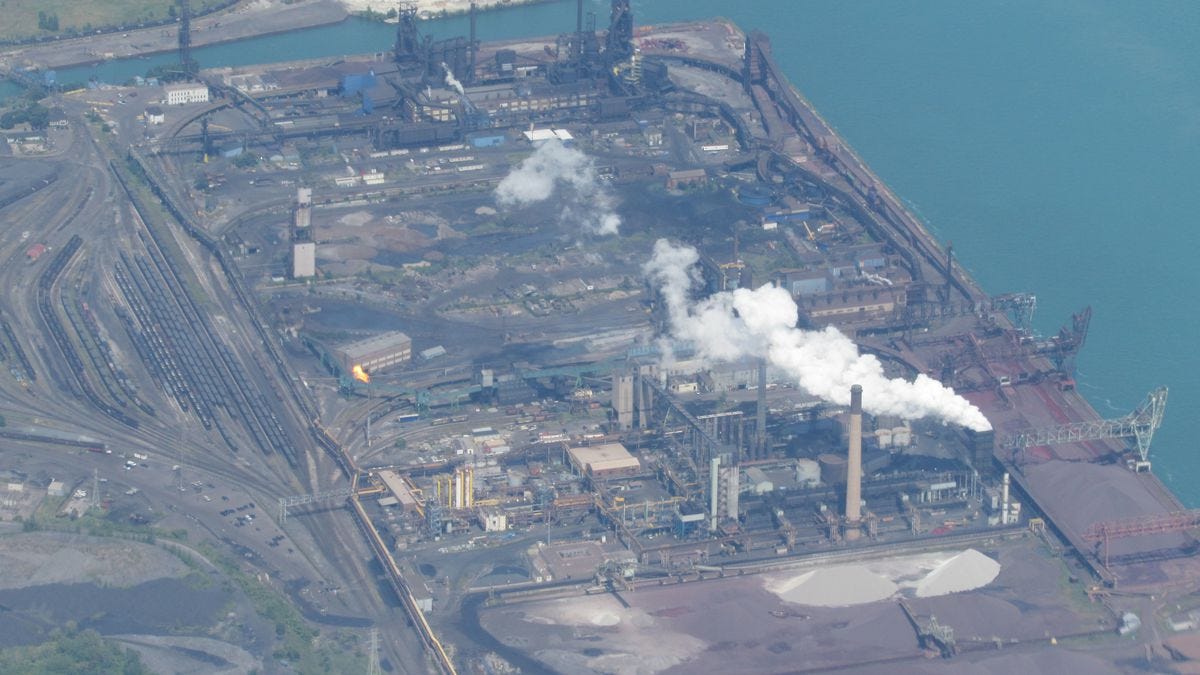(“Zug Island.” Photo credit)
“Fire Lake” appeared appeared on March 12th, 2023 at 365 Tomorrows.
Fire Lake
“He was the one afraid to cut the cake”
-Bob Seger
When workers joined the lines at the Gratiot Plant, they signed away their hands. Losing their hands was the first step toward gainful employment.
After three years, workers signed away their forearms. This gesture was necessary because the hands could do work not even the strongest forearms could. A pair of robotic hands could immediately lift fifty kilos on even a spindly armed worker. Engineers knew most men could not sustain robotic hands without the requisite forearms and biceps. But Gratiot would not invest in anything more than a set of bio-automated hands until a worker had delivered three years of productive labor.
If a worker reached their third anniversary, they earned their forearms. Then, two years later, if their non-robotic biceps still worked, the Gratiot engineers replaced those, too. Since the labor situation was dire, very few workers protested this arrangement. They accepted “bio-automation” as needful if not normal.
But for those workers who did not “make it,” the company kept industrial peace by telling their labor force that anyone whose body broke down would get sent to Fire Lake.
They said Fire Lake was a place of clean water, pristine beaches, and real trees. It was a compound of climate-controlled cottages where attendants fed residents gourmet food and clothed and bathed them since their limbs did not work. Rumor had it that Fire Lake was a pleasure dome so perfect it kept out all doubts, fears, memories.
But Fire Lake presented a powerful dilemma. Gratiot Plant workers knew they had to prove their productivity and manhood to earn forearms and biceps. No plant employee had a Fire Lake attendant washing their privates or wiping their asses. A standard workday was 16 hours, six days a week, and workers had been on the line since they turned thirteen. All they knew was labor, and the thought of one day being cared for as children offended them. However, as the years wore on and their bodies aged, Fire Lake loomed large since no one knew what it actually was. It could be Valhalla or Gehenna.
One worker, we’ll call him ‘Joe,’ decided he would find out. He had been on the line for fifteen years, and at age twenty-eight, Joe was the oldest man at Gratiot. He knew his time with the company was short, and Joe felt it would not be long before his robotic arms worked, but his non-automated back broke.
So, when the steam whistle blew, Joe climbed into the back of a transport he knew was headed to Fire Lake. It had taken him months to learn about the truck and its destination. Since Joe was a Gratiot veteran, he had some contacts in supply chain management with whom he drank. He knew who held their liquor and who did not, and eventually, Joe got the information that he wanted.
He hid deep in the transport bed and bedded down on a palette of something so wrapped in plastic he could not tell what it was. Joe had no idea how long the trip would take. All he knew was that he was not coming back.
Joe was on his way to Fire Lake.
On the north side of town was a foundry none of the Gratiot workers had heard about. It took the transport only twenty minutes to get there. Joe, who had closed his eyes expecting a good nap and a long ride, was shocked when the back doors swung open and the truck bed lifted up before angling downward at about forty-five degrees.
As a terrific heat and a blinding light filled the transport bed, Joe realized he had in fact reached Fire Lake. It was bliss.
-Jeremy Nathan Marks





Thank you @David Angel. I really appreciate the restack. 😊